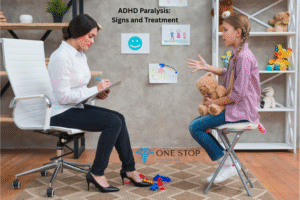Post-traumatic stress disorder (PTSD) is a widespread mental health issue that can occur after experiencing a traumatic event. It includes symptoms like flashbacks, anxiety, negative thoughts and beliefs, hypervigilance, and more.
At One Stop Psychiatry, our professional team provides evidence-based treatment for PTSD, e.g, psychotherapy, also known as talk therapy. We offer both telepsychiatry and in-person treatment options in Florida.
What is Post-Traumatic Stress Disorder (PTSD)?
Post-Traumatic Stress Disorder (PTSD) is a mental health condition that can develop in individuals who have experienced or witnessed a traumatic event. This may involve military combat, physical or sexual assault, natural disasters, accidents, abuse, or the sudden death of a loved one. The emotional and psychological responses to these events can lead to long-term effects that extend significantly beyond the event itself.
The symptoms of Post-Traumatic Stress Disorder (PTSD) fall into four categories
Intrusive memories
-
- Intrusive thoughts, such as repeated, involuntary memories.
-
- Nightmares.
-
- Flashbacks of the traumatic event, which can be very vivid and feel real.
Negative change in Mood and cognitive symptoms
-
- Sensations of loneliness and alienation from other people
-
- Ignoring or having trouble recalling significant details of the traumatic experience
-
- Having trouble experiencing happy feelings
-
- Negative feelings like shame, guilt, or fear
Avoidance Behaviors
-
- Avoiding people, places, or conversations related to the trauma
-
- Withdrawing from social activities or loved ones
Arousal reactivity symptoms
-
- Challenges with concentration
-
- Sleep issues, including trouble falling asleep or staying asleep, excessive sleeping, or diminished sleep quality
-
- Participating in risky behaviors
-
- Feeling tense or on edge
-
- Irritability and angry episodes.
Types of Post-Traumatic Stress Disorder (PTSD)
While PTSD is often generalized, mental health professionals recognize different types:
-
- Normal Stress Response – Occurs after a traumatic event but typically improves with support and self-care.
-
- Acute Stress Disorder (ASD) – Symptoms last less than a month but may develop into chronic PTSD if untreated.
-
- Uncomplicated PTSD – Involves clear symptoms such as flashbacks and avoidance, without other mental health disorders.
-
- Complex PTSD (C-PTSD) – Develops from long-term or repeated trauma, such as ongoing abuse or neglect.
Comorbid PTSD – When PTSD occurs alongside other mental health conditions such as depression, anxiety, or substance use disorder.

How is PTSD diagnosed?
An accurate diagnosis of PTSD involves self-report assessment and physical examination, or a psychological test.
A psychiatrist, psychologist, or social worker typically is the one to diagnose and treat individuals with symptoms of PTSD.
Being open with your clinician will help you get an accurate diagnosis. PTSD may be diagnosed when symptoms last more than a month after the traumatic event. Some of the symptoms are able to clear up in the course of months, and in some cases it takes years.
Treatment of PTSD at One Stop Psychiatry
Evidence-Based Therapies
We draw upon evidence-based therapeutic modalities, including:
Trauma-Focused Cognitive Behavioral Therapy (TF-CBT): Aims to recognize and challenge negative thoughts that develop in response to the trauma.
Eye Movement Desensitization and Reprocessing (EMDR): A therapy treatment to reduce the emotional effects of painful memories.
Prolonged Exposure Therapy: Encourages lesser fear and avoidance by directly facing cues related to trauma in a safe setting.
Medication Management
Medication can be helpful for some people in controlling their symptoms — such as anxiety, depression, or sleep disturbance. Our psychiatrists assess your needs and consider options that would be the most efficacious and safe for you.
The experience of PTSD can be quite overwhelming, but it is essential to remember that recovery is within reach. With the right combination of therapy, medication, and support, individuals can conquer the challenges of trauma and move towards a healthier, more fulfilling life.
How One Stop Psychiatry Can Help with PTSD?
If you or someone you know is dealing with PTSD, professional help is readily available. At One Stop Psychiatry, we offer both telepsychiatry and in-person treatment options in Florida, tailored to your individual needs.
Find a psychiatrist near you and schedule an appointment today—we’re here to support you every step of the way with the treatment and resources needed for a healthier, happier future. Call us at: (754) 270-6322




